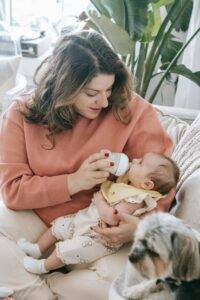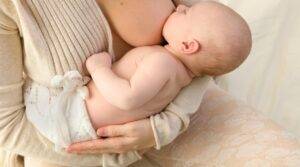When you’re a new parent, every little thing about your newborn feels magical and worrisome. One question you may have is, “Are newborn baby hiccups normal?”
This comprehensive guide delves into everything parents need to know about newborn baby hiccups, including why they happen, when to worry, and how to help your baby through them.
Understanding Newborn Baby Hiccups
Hiccups are involuntary contractions of the diaphragm, the muscle that separates the chest from the abdomen and plays a crucial role in breathing. When this muscle contracts suddenly, the vocal cords close quickly, producing the “hic” sound. Hiccups are common in adults and children, but newborns experience them more frequently.
Are Newborn Baby Hiccups Normal?
Yes, newborn baby hiccups are entirely normal. They start even before the baby is born. Many pregnant women report feeling their baby hiccup inside the womb. Once the baby is born, hiccups occur frequently during the first few months of life. The newborn’s diaphragm is still maturing, and the hiccups indicate this stage of development.
Why Do Newborns Get Hiccups?
- Feeding: Hiccups occur during or after feeding since the baby is swallowing air while eating, or the stomach expands quickly, which irritates the diaphragm.
- Temperature Changes: Sudden changes cause the diaphragm to contract, leading to hiccups.
- Excitement or Stimulation: Sometimes, excitement or over-stimulation triggers hiccups in babies.
- Gastroesophageal Reflux (GER): Hiccups can be a symptom of GER, where stomach contents go back into the esophagus, irritating the diaphragm.
Feeding-Related Hiccups
Feeding is one of the most common triggers for newborn hiccups. Babies swallow air while feeding, especially if they’re bottle-fed or fed too quickly. The swallowed air causes the stomach to expand and press against the diaphragm, triggering hiccups.
To minimize this, feed your baby in an upright position and take breaks to burp them frequently.
Temperature and Hiccups
Newborns are sensitive to changes in temperature, which can sometimes cause hiccups. A sudden shift from a warm environment to a cooler one can trigger the diaphragm to contract. Ensure your baby is dressed appropriately for the temperature and try to avoid abrupt changes in their surroundings.
Excitement and Stimulation
Babies become over-stimulated by their surroundings, especially if there are new sights and sounds. This excitement leads to hiccups. Keep a calm and soothing environment to prevent over-stimulation and reduce the likelihood of hiccups.
Gastroesophageal Reflux (GER)
GER is a condition where stomach contents flow back into the esophagus, causing discomfort and sometimes triggering hiccups. If your baby seems to have persistent hiccups with symptoms like spitting up frequently, coughing, or showing discomfort during or after feeding, it could indicate GER.
Consult your pediatrician for advice on managing this condition.
When to Be Concerned About Newborn Hiccups
While newborn hiccups are generally harmless, few signs might indicate a problem. Parents should consult their pediatrician if:
- Hiccups are frequent and prolonged: If your baby’s hiccups last for more than a few minutes several times a day, it could indicate an underlying issue.
- Hiccups interfere with feeding or sleeping: If your baby’s hiccups are causing significant distress or interrupting feeding and sleeping,
- Symptoms of reflux are present: If your baby is vomiting frequently, seems uncomfortable or in pain, and has persistent hiccups, they might be experiencing gastroesophageal reflux.
When Hiccups Are a Red Flag
Though rare, persistent and frequent hiccups can sometimes be an underlying medical condition. If your baby’s hiccups are accompanied by other symptoms like difficulty breathing, a persistent cough, or a failure to gain weight, seek medical advice promptly.
These symptoms indicate issues such as GERD or even respiratory problems that require professional evaluation and treatment.
How to Prevent and Stop Newborn Hiccups
1. Burp your baby during feedings
Frequent burping during and after feedings helps reduce the amount of air swallowed, which minimizes hiccups. Here are some burping techniques:
- Over-the-shoulder burping: Hold your baby against your shoulder and gently pat or rub their back.
- Sitting on your lap: Sit your baby on your lap, supporting their chest and head with one hand while patting their back with the other.
- Laying on your lap: Lay your baby across your lap on their tummy, supporting their head and gently patting their back.
2. Ensure proper feeding techniques
- Frequent, smaller feedings: Instead of giving large feedings, offer smaller amounts more frequently to prevent overfilling the stomach or getting too full quickly.
- Paced bottle feeding: Allow your baby to take breaks during feeding to burp and relax before continuing. This involves holding the bottle horizontally and allowing your baby to draw out the milk, mimicking breastfeeding and reducing air intake.
- Proper latching: If breastfeeding, ensure your baby has a good latch to minimize the amount of air swallowed.
3. Monitor Feeding Times
- Observe Feeding Patterns: Pay attention to your baby’s feeding patterns and try to feed them before they get overly hungry or fussy, which leads to gulping and increased air intake.
- Take Breaks: During feedings, take breaks to burp your baby and allow them to digest the milk slowly, which can help prevent hiccups.
4. Maintain proper feeding positions.
Hold your baby upright during and after feeding to help prevent hiccups. Gravity helps keep the milk down and reduces the air that can be swallowed. After feeding, keep your baby upright for about 20-30 minutes to allow for proper digestion and reduce the risk of hiccups.
5. Recognize Feeding Cues
Understanding and responding to your baby’s feeding cues helps prevent hiccups. Feed them when calm and hungry, rather than waiting until they’re overly hungry and crying. This reduces the air they swallow. Look for early hunger signs such as rooting, sucking on fingers, or making smacking noises.
6. Check the bottle
If bottle-feeding, ensure the nipple flow is appropriate for your baby’s age to reduce the risk of swallowing air. For newborns, slow-flow nipples are adequate.
7. Create a Calm Feeding Environment
This helps minimize the amount of air your baby swallows and reduce the likelihood of hiccups. Dim the lights, reduce noise, and ensure you and your baby are comfortable during feeding sessions. Also, feed your baby in a quiet, calm environment to reduce distractions and stress, which can contribute to swallowing air.
What Not to Do
- Startling your baby: This is distressing and doesn’t help with hiccups.
- Pulling on the tongue or giving a lemon: These methods are not recommended for newborns and can be harmful and ineffective.
Natural Remedies for Newborn Hiccups
Gripe Water
- What is Gripe Water?: Gripe water is a natural remedy to soothe colic, gas, and hiccups in babies. It contains a blend of herbs, such as fennel, ginger, and chamomile.
- How to Use: Follow the instructions on the product label and consult your pediatrician before giving gripe water to your baby.
Herbal Teas
- Chamomile Tea: Chamomile tea is known for its calming properties. Some parents give their baby a few drops of cooled chamomile tea to help with hiccups.
- Fennel Tea: Fennel tea helps with digestion and reduces gas, which helps with hiccups. Consult your pediatrician before giving any herbal teas to your baby.
The Science Behind Hiccups
- The Role of the Diaphragm
The diaphragm is a dome-shaped muscle located just below the lungs. It plays a vital role in breathing by contracting and relaxing to allow air in and out of the lungs. In newborns, the diaphragm is still developing, and this immaturity leads to frequent hiccups.
- Nervous System Development
Newborns’ nervous systems are also still developing, and the control of the diaphragm and other muscles is not yet fully coordinated. This lack of coordination results in sporadic contractions that cause hiccups. Over time, as the nervous system matures, the frequency of hiccups decreases.
- Feeding and Hiccups
During feeding, whether breastfeeding or bottle-feeding, babies swallow air, which leads to hiccups. The rapid milk intake causes the stomach to expand quickly, pushing against the diaphragm and triggering hiccups. Ensuring a proper latch during breastfeeding or choosing the right bottle nipple helps minimize this issue.
Understanding Gastroesophageal Reflux (GER) in Newborns
Gastroesophageal reflux (GER) is when stomach contents flow back into the esophagus. It’s relatively common in newborns and can cause hiccups and other symptoms such as spitting up, irritability, and discomfort after feedings.
Symptoms in Newborns
- Frequent Spitting Up: Spitting small amounts of milk after feedings is normal, but frequent or forceful spitting might indicate GER.
- Irritability and Crying: If your baby is often fussy or crying after feedings, it could be a sign of discomfort caused by reflux.
- Poor Weight Gain: Difficulty gaining or losing weight may be associated with severe cases of reflux.
Management
- Feed Smaller Amounts More Frequently: This helps manage reflux by reducing the volume of milk in the stomach.
- Keep Baby Upright After Feedings: Hold your baby upright for 20-30 minutes after feeding to prevent stomach contents from backing up.
- Thicken Feedings: Doctors recommend thickening formula or expressed breast milk with a small amount of rice cereal to keep the milk down.
FAQs About Newborn Baby Hiccups
Can Hiccups Harm My Baby?
No, hiccups are generally harmless and a normal part of your baby’s development. They are more of a nuisance than a problem.
Should I Wake My Baby if They Hiccup While Sleeping?
No, if your baby is hiccuping while sleeping and it doesn’t seem to bother them, there’s no need to wake them. Hiccups don’t interfere with breathing and are short-lived.
Are There Any Long-Term Effects?
There are no long-term effects of hiccups on your baby’s health. They typically decrease in frequency as your baby grows and their digestive system matures.
How Long Do Hiccups Last in Newborns?
Hiccups last anywhere from a few seconds to several minutes. If they persist for an hour or cause significant discomfort, consult your pediatrician.
Can Breastfeeding Help Reduce Hiccups?
Yes, breastfeeding helps reduce hiccups, providing comfort and a steady flow of milk, which calms the diaphragm.
How Often Do Newborns Get Hiccups?
Newborns get hiccups several times and usually no cause for concern. As they grow, the frequency of hiccups typically decreases.
Myths and Facts About Newborn Hiccups
Myth: Hiccups Are a Sign of Digestive Problems
One common myth is that hiccups are a sign of digestive problems in newborns. While it’s true that gastroesophageal reflux can cause hiccups, for most babies, hiccups are simply a normal part of development and not an indication of any digestive issues.
Myth: You Should Try to Stop Hiccups Immediately
Many parents feel the need to stop hiccups as soon as they start. However, hiccups in newborns are usually harmless and will resolve independently. Trying to stop them causes more stress for the baby and the parents. It’s best to remain calm and let the hiccups run their course.
Fact: Hiccups Can Occur in the Womb
It’s fascinating to note that hiccups begin even before birth. Many pregnant women report feeling their baby hiccup inside the womb, typically during the second or third trimester. These prenatal hiccups are a normal part of fetal development and aren’t a cause for concern.
Fact: Hiccups Are Common in Newborns
Hiccups are very common in newborns, especially in the first few months of life. This is due to the immaturity of the diaphragm and the developing nervous system. As your baby grows and their systems mature, the frequency of hiccups will usually decrease.
Manage Hiccups Effectively as They’re Normal in Newborns
So, are newborn baby hiccups normal? Absolutely yes! They’re a common and typically harmless part of infancy. Understanding why they happen and how to manage them helps ease any worries you might have as a new parent. Consult a healthcare professional for your concerns about your baby’s health.
For more resources on newborn care and other pediatric topics, visit Omegapediatrics.com, where you’ll find a wealth of information to support you through your parenting journey.
- A Parent’s Guide to Finding Quality Pediatric Care After Hours
- Newborn Parenting: Exploring Common Guides and Tips for New Parents
This post has provided a comprehensive look at newborn baby hiccups, ensuring you have the knowledge and confidence to handle this common occurrence. With this, you can rest assured that you’re well-prepared to care for your little one.






